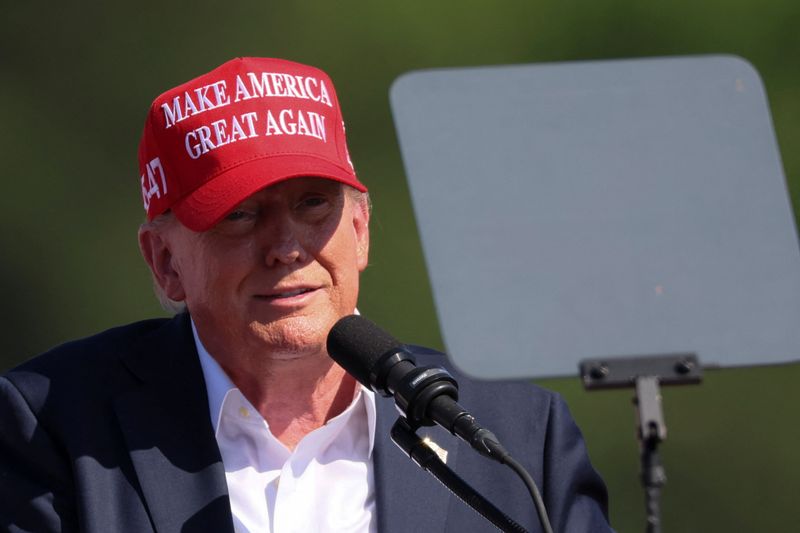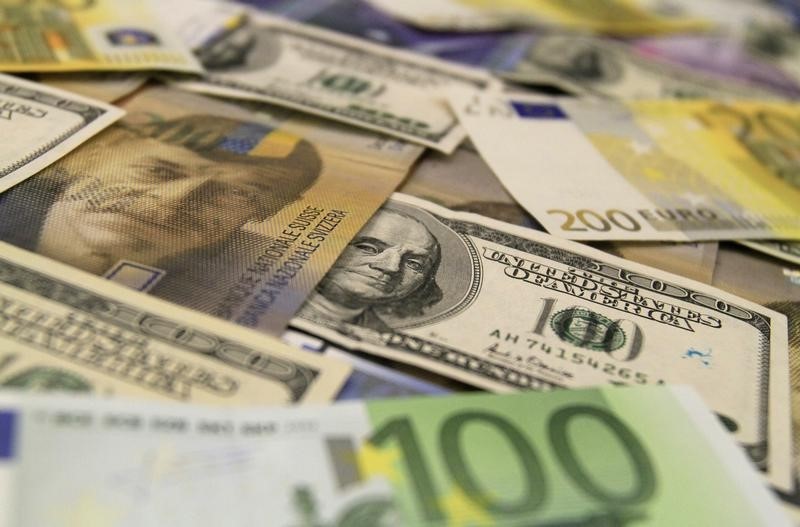By Rodrigo Campos
NEW YORK (Reuters) – The possibility of former President Donald Trump winning back the White House in November has investors preparing for several scenarios, with America’s “backyard” high on the list of markets to watch.
The Trump administration briefly engaged with much of Latin America, including during the distribution of COVID-19 vaccines and when the U.S. government withheld significant financial aid in exchange for stricter migration policies in Central America.
Below are the pressure points identified by investors anticipating the impact of a possible second Trump administration on the region:
A GOOD NEIGHBORHOOD
Mexico has long been an emerging markets weather vane for US policies and their impact on broader emerging markets, but this time domestic factors would make the situation more complex.
Trump’s 2016 election victory caused the peso to fall by almost 8% in a week.
But this time, the peso has already fallen 6% this year, following a slump in June when the ruling party won a supermajority in the country’s elections, with markets fearful of constitutional changes and reduced checks and balances.
As for US-Mexico relations, trade is expected to be at the top of the agenda, according to analysts. Trump led the renewal of the US-Mexico-Canada Trade Agreement (USMCA) and a planned review will take place in two years. The next American president will have a chance to confirm whether his country will remain in this position.
“It is highly unlikely that Trump will abandon the USMCA, but he could threaten to do so to induce higher tariffs and more foreign investment in the US manufacturing sector,” said Hasnain Malik, head of equity research at Tellimer in Dubai.
“For Mexico, relations will be less comfortable more broadly, with Trump’s focus on border controls potentially hurting remittance growth in the longer term.”
The peso is expected to be volatile ahead of the US election as traders use it to hedge or double Biden’s re-election chances.
PERSONAL RELATIONSHIPS
Two of Latin America’s most flamboyant right-wing populists – El Salvador’s President Nayib Bukele and Argentina’s President Javier Milei – joined Trump at February’s Conservative Political Action Conference, the largest gathering of American conservative activists and politicians. Both countries are seeking financial support from the Washington-based International Monetary Fund (IMF).
In 2018, Trump openly supported Argentine President Mauricio Macri in his push for IMF money, which grew into a massive $44 billion program. Milei, a public Trump backer, is widely expected to ask for fresh money once the current program ends in December — if not sooner.
It is also expected that El Salvador’s Bukele will work with the IMF again after the US elections with the aim of getting a new program. An offer from El Salvador in April of a bond that would raise yields if the country fails to secure a new IMF program or a significant credit rating upgrade in the next 18 months was seen by analysts as a Bukele’s bet that Trump would win the White House. and put in a good word for him at the IMF.
“(Bukele) has a pretty close relationship with the Republicans,” said Thys Louw, portfolio manager at Ninety One, adding that El Salvador is also trying to find new funding elsewhere.
“The hope is that once there is a Trump administration, they will lean on the IMF, and the IMF will be much more lenient toward them.”
VENEZUELA SANCTIONS OUTLOOK
The manner in which Venezuela’s July 28 presidential election will proceed could likely determine whether the country has any prospect of reunification with the international community. In his previous term, Trump increased sanctions against the South American oil producer; Biden has sought to repair ties with an eye to ensuring fair elections.
The next US president will likely determine whether a large-scale debt restructuring – Venezuela owes at least $60 billion on government bonds alone – will take place, as this would require new bonds, which are currently blocked by US sanctions.
“Venezuela is one of those countries that will likely be subject to change under the Trump administration,” said Bradley Wickens, CEO of Broad Reach Investment Management. relaxation between Washington and Caracas.
“I’m not sure this will continue under Trump.”
Relations with Cuba and Nicaragua, both led by authoritarian governments, are also expected to come under further strain under a Trump administration.
ESCALATION OF THE CHINA TRADE WAR

Hurdles and additional costs on trade with China imposed during the Trump administration have been kept in place by Biden, who has further increased pressure on Beijing.
Some analysts expect that if the trade war with China intensifies, Beijing could choose to devalue its currency to make exports more competitive. Such a move could be felt by commodity exporters in Latin America, with Brazil, Argentina, Mexico and Chile among Beijing’s largest regional trading partners.


